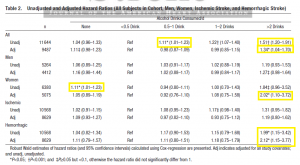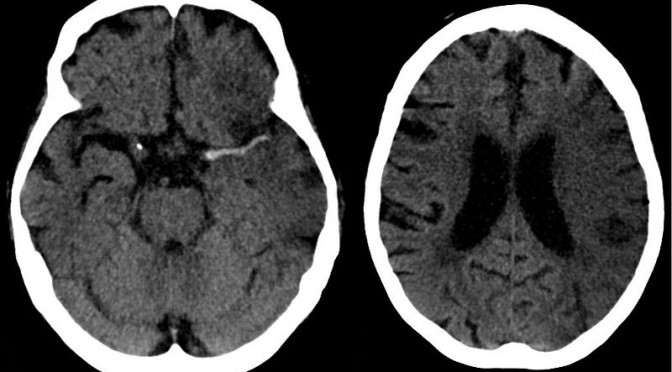I read a headline this morning reading: “one glass of wine increases stroke risk by 1/3”.
With all the positive benefits of wine we see in the research, could it really be that one glass of wine just so happens to also cause us harm by increasing our stroke risk by 1/3?
I wanted to take a moment to clear up the ACTUAL results, and to
![Photo By Blausen Medical Communications, Inc. (Donated via OTRS, see ticket for details) [CC BY 3.0 (http://creativecommons.org/licenses/by/3.0)], via Wikimedia Commons](http://french-paradox.net/wp-content/uploads/2015/01/stroke-french-paradox-206x300.png)
It is important to note that the population involved in this study was middle aged individuals who were followed over a period of 43 years until either their death or old age.
One Media Headline I Read: “One glass of wine increases stroke risk by 1/3”. A similar alternative headline read; “One large glass of wine increases stroke risk by 1/3”.
ACTUAL Results:
- Mid-life alcohol consumption of 2 or more drinks per day increased risk of stroke later in life by 34%.
- Results showed some possible evidence that not drinking at all also increased the risk of stroke (more research needed).
- Stroke risk associated with heavy drinking is comparable to stroke risk due to risk factors for diabetes and hypertension.
- The risk of stroke associated with heavy drinking was greater earlier on, however, as subjects aged, particularly past of age of 75, risk of stroke associated with diabetes and hypertension was greater than the risk of stroke associated with alcohol consumption.
- In heavy drinkers, the risk of hemorrhagic stroke was greater than the risk of ischemic stroke.
- Taking a look at the adjusted data from Table 2 of this study (click photo to enlarge), you can see I’ve highlighted in yellow the “hazard ratio” data that
 were actually significant in this study.
were actually significant in this study.
- For all participants, the UNADJUSTED odds ratio for stroke when consuming between 0.5-1 drinks per day (i.e. moderate) was significant. When these data were ADJUSTED for confounding factors, moderate alcohol consumption odds of stroke were no longer significant. This means that there could be other factors NOT related to alcohol consumption that was causing an observed increase in stroke in this group.
- For all participants, the UNADJUSTED odds ratio for stroke when consuming between >2 drinks per day (i.e. heavy) was significant. When these data were ADJUSTED for confounding factors, heavy alcohol consumption odds of stroke were still significant. This means bad news bears for heavy drinkers.
- For women, the ADJUSTED odds ratio for stroke for heavy drinkers was significant. The ratio was not quite significant for heavy drinking men, indicating that either the sample size was too small, or women may be driving the overall increased risk of stroke when consuming at least 2 drinks per day.
- For women, the UNADJUSTED odds ratio for stroke for nondrinkers was significant. When these data were ADJUSTED for confounding factors, odds of stroke for nondrinking women were no longer significant. This means that there could be other factors NOT related to alcohol consumption that was causing an observed increase in stroke in this group (my guess would be related to hormone changes in midlife through old age).
- When comparing sets of twins where one twin drank and the other did not:
- Prolonged time to stroke for nondrinkers was: 2.07 years.
- Prolonged time to stroke for light drinkers (<0.5 drinks/day) was 0.77 years.
- Prolonged time to stroke for moderate drinkers (1-2 drinks/day) was 1.15 years.
- Prolonged time to stroke for heavy drinkers (>2 drinks/day) was -5.68 years.
- This means that heavy drinkers tended to suffer from stroke about 5 years earlier than all other drinkers and nondrinkers.
- While drinking any amount of alcohol decreased the time until stroke, interestingly moderate consumption (1-2 drinks/day) actually improved on this time compared with light drinkers (<0.5 drinks/day).
- Mid-life alcohol consumption of 2 or more drinks per day increased risk of stroke later in life by 34%.
Conclusions
![Photo By Hellerhoff (Own work) [CC BY-SA 3.0 (http://creativecommons.org/licenses/by-sa/3.0)], via Wikimedia Commons](http://french-paradox.net/wp-content/uploads/2015/01/stroke-ct-french-paradox-300x192.jpg)
Nondrinkers were shown to have increased stroke risk compared with light drinkers, indicating that while boozing it up may not be the best idea, remaining abstinent may not be either.
The greatest risk of increased stroke in this study was seen in heavy drinkers drinking at least TWO alcoholic drinks per day. One alcoholic drink equals one standard glass of wine. Two alcoholic drinks equal two standard glasses of wine. Sure, I can make a really really big one glass of wine, but is that a standard glass? No, it’s not.
Rather than confusing readers with these vague headlines, we should be more specific and speak in terms of standards instead of what the bar down the street considers a single glass.
Source:

